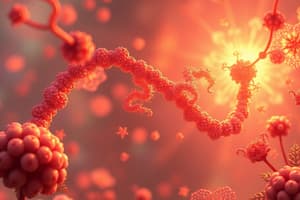Podcast
Questions and Answers
What is gene amplification?
What is gene amplification?
- A random change in the number of genes present in a cell
- An increase in the copy of a particular gene without an increase in the number of copies of other genes (correct)
- An increase in the number of genes present in a cell
- A decrease in the copy of a particular gene without affecting the number of copies of other genes
How can gene amplification occur naturally?
How can gene amplification occur naturally?
- Through gene deletion, replication and repair slippage, crossing-over between homologous chromosomes, aneuploidy, and polyploidy
- Through gene translocation, replication and repair slippage, ectopic recombination, aneuploidy, and monoploidy
- Through gene inversion, replication and repair slippage, crossing-over between non-homologous chromosomes, aneuploidy, and monoploidy
- Through gene duplication, replication and repair slippage, ectopic recombination, aneuploidy, and polyploidy (correct)
What is the term for the piece of DNA or the gene that gets amplified naturally or artificially?
What is the term for the piece of DNA or the gene that gets amplified naturally or artificially?
- Exon
- Codon
- Transcript
- Amplicon (correct)
How is gene amplification artificially done in a lab?
How is gene amplification artificially done in a lab?
What is the recommended range for GC content in primer sequences?
What is the recommended range for GC content in primer sequences?
Why is it important to check primer specificity by BLAST?
Why is it important to check primer specificity by BLAST?
What is the recommended length range for primer sequences?
What is the recommended length range for primer sequences?
What is the formula to calculate the melting temperature (Tm) of a primer?
What is the formula to calculate the melting temperature (Tm) of a primer?
What does the annealing temperature (Ta) depend directly on?
What does the annealing temperature (Ta) depend directly on?
What does the presence of a GC clamp in a primer sequence refer to?
What does the presence of a GC clamp in a primer sequence refer to?
What is the recommended range for melting temperatures (Tm) of primer sequences?
What is the recommended range for melting temperatures (Tm) of primer sequences?
Why is it important to know the product size of the amplified target sequence?
Why is it important to know the product size of the amplified target sequence?
Which technique utilizes RNA intermediates for gene amplification?
Which technique utilizes RNA intermediates for gene amplification?
What is a specific advantage of Ligase chain reaction (LCR) over PCR?
What is a specific advantage of Ligase chain reaction (LCR) over PCR?
Which method is commonly used to produce billions of copies of a target DNA sequence in a short time?
Which method is commonly used to produce billions of copies of a target DNA sequence in a short time?
What governs the three distinct steps of denaturation, annealing, and extension in PCR?
What governs the three distinct steps of denaturation, annealing, and extension in PCR?
What determines the number of copies produced in PCR?
What determines the number of copies produced in PCR?
What is a key component required for PCR to target the DNA to be amplified?
What is a key component required for PCR to target the DNA to be amplified?
What is the role of reverse transcriptase in Transcription-mediated amplification (TMA)?
What is the role of reverse transcriptase in Transcription-mediated amplification (TMA)?
What is the primary purpose of post-PCR analysis?
What is the primary purpose of post-PCR analysis?
What is the main advantage of Ligase chain reaction (LCR) over PCR?
What is the main advantage of Ligase chain reaction (LCR) over PCR?
What is the primary function of Ligase chain reaction (LCR)?
What is the primary function of Ligase chain reaction (LCR)?
Which enzyme is essential for the rapid amplification of target genes in Transcription-mediated amplification (TMA)?
Which enzyme is essential for the rapid amplification of target genes in Transcription-mediated amplification (TMA)?
What is the main role of DNA polymerase in PCR?
What is the main role of DNA polymerase in PCR?
What is the main purpose of gene amplification?
What is the main purpose of gene amplification?
Which gene amplification technique is more specific than PCR and used to identify point mutations?
Which gene amplification technique is more specific than PCR and used to identify point mutations?
What is the main role of transcription-mediated amplification (TMA)?
What is the main role of transcription-mediated amplification (TMA)?
What is the main function of PCR in the lab?
What is the main function of PCR in the lab?
What governs the three distinct steps of PCR: denaturation, annealing, and extension?
What governs the three distinct steps of PCR: denaturation, annealing, and extension?
How many copies of the target DNA can PCR produce in about 20 cycles?
How many copies of the target DNA can PCR produce in about 20 cycles?
What is the main requirement for PCR to target the DNA to be amplified?
What is the main requirement for PCR to target the DNA to be amplified?
What is the mechanism of PCR primarily involved in?
What is the mechanism of PCR primarily involved in?
What does post-PCR analysis involve?
What does post-PCR analysis involve?
What determines the number of copies produced in PCR?
What determines the number of copies produced in PCR?
What is the main role of ligase chain reaction (LCR) in gene amplification?
What is the main role of ligase chain reaction (LCR) in gene amplification?
What is the primary function of gene amplification in research and diagnosis?
What is the primary function of gene amplification in research and diagnosis?
Flashcards are hidden until you start studying
Study Notes
Gene Amplification Techniques: PCR, LCR, and TMA
- Retrotransposition is a type of transposon that copies itself through RNA intermediates, and is commonly found in tumour cells.
- Amplification of genes is useful for disease diagnosis, understanding disease progression, and can lead to drug resistance in cancer cells.
- Artificial gene amplification is used in research, diagnosis, recombinant DNA technology, and to produce desired gene products.
- Polymerase chain reaction (PCR) is a commonly used method to produce multiple copies of a desired gene in the lab, and is essential in modern science and biotechnology.
- Ligase chain reaction (LCR) is another method of gene amplification, more specific than PCR, and widely used to ascertain point mutations such as in genetic diseases.
- Transcription-mediated amplification (TMA) utilizes RNA polymerase and reverse transcriptase to rapidly amplify target genes.
- PCR is a means to amplify a particular piece of DNA and can make billions of copies of a target sequence of DNA in a short time.
- PCR requires specific DNA sequence information to target the DNA to be amplified and uses synthetic oligonucleotide primers.
- PCR proceeds in three distinct steps governed by temperature: denaturation, annealing, and extension.
- The mechanism of PCR involves denaturation of template DNA, primer annealing, and DNA synthesis by DNA polymerase.
- PCR can produce about a million copies of the target in only 20 cycles, and the number of copies is determined by 2n, where n is the number of cycles.
- Post-PCR analysis involves primer design, primer specificity, PCR optimization, and visualization of results using agarose gel electrophoresis.
Studying That Suits You
Use AI to generate personalized quizzes and flashcards to suit your learning preferences.




